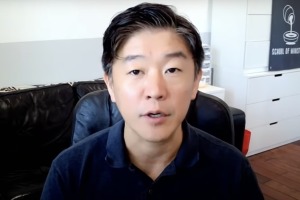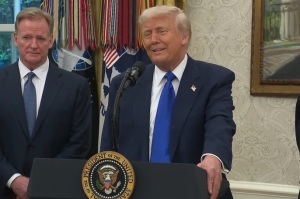Paul Ryan Sets Stage for General Election Budget Battle
Budget Committee Chair Paul Ryan (R-Wis.) described his budget proposal as a "referendum" on Sunday.
On ABC's "This Week," Ryan said he was "excited about going to the country with a choice of two futures." He called the budget a "referendum," adding, "I think we need to bring this referendum to our country, and I'm looking forward to this."
Ryan has become a leader in the Republican Party on budget issues. Mitt Romney, the likely Republican presidential nominee, endorsed the "Ryan budget"(as it has been called) helping to ensure that the reform ideas contained in the budget will become the cornerstone of the Republican platform in the 2012 elections.
The budget resolution, called "Path to Prosperity," passed the House, 228-191, on Thursday. Only ten Republicans, along with every Democrat, opposed the measure.
The plan proposes to reduce the current growth in federal government spending by $5.3 trillion over 10 years. It would replace the current health care law, the Affordable Care Act (2010), with a refundable tax credit to purchase health insurance. To save money on Medicare, the fastest growing part of the federal budget, the eligibility age would be increased to 67. Also, seniors would be given a voucher that could be used to stay in the Medicare system or to purchase insurance in the private health insurance market.
The budget would not gain any new revenue from increasing tax rates. Instead, it seeks to reform the tax code and remain revenue neutral by lowering rates and eliminating some deductions and credits.
Ryan accused the Democrats of avoiding the problems associated with the unsustainable growth of the national debt.
"The president has been ducking this debt crisis all along," Ryan said. "The Senate's not even passing a budget. We have the most predictable crisis coming in America, and we're doing something about it."
Chris Van Hollen (D-Md.), the ranking Democrat on the House Budget Committee, was also interviewed on "This Week," and argued that Democrats also want to reduce the deficit but differ with Republicans on how to do that.
"I'm not at all surprised that Mitt Romney endorsed the Republican House plan. That plan asks nothing, nothing of the wealthiest Americans, therefore it hits everybody else. It hits seniors on Medicare, it hits middle-income taxpayers," Van Hollen said.
Van Hollen also accused Republicans of increasing taxes on middle income Americans to pay for tax breaks for the wealthy.
The current tax cuts, first passed under President George W. Bush and extended by President Obama in 2010, are set to expire at the end of 2012. The "tax cuts" Van Hollen is referring to are cuts aimed at preventing the tax increases already set to go into effect in 2013.
The Ryan budget did not specify how low the rates should go, or which deductions should be eliminated, only that the changes would be revenue neutral. Those decisions would be left to the Ways and Means Committee.
"We're saying, just don't raise taxes," Ryan answered. "The number Chris [Van Hollen] is using presumes a huge tax increase in the Fall. We don't want a huge tax increase because it's going to slow down the economy. So, we're saying bring in the same amount of revenue we're bringing in today, but do it more fairly, with a better, simpler, more competitive tax system. Take the loopholes and tax shelters away so you can lower everybody's tax rates across the board, that produces jobs and economic growth."





























